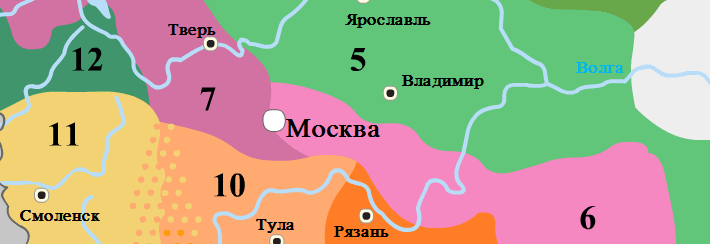
In some Northern Russian dialects (especially Pomor and Arkhangelsk regions), people say:
• домот = “the house”
• жената = “the woman”
• селото = “the village”
These postfixed elements ‑to, ‑ta, ‑te strongly resemble the definite articles in Bulgarian and Macedonian, e.g. къщата, детето, хората.
But here’s the kicker:
They didn’t get this from the Balkans.
In fact, these Northern Russian dialects developed the suffixes independently, and linguists believe they were influenced by contact with Finnic or Uralic languages, which often use postpositions and topic-marking particles.
So what does this have to do with Bulgarian?
Well, Proto-Bulgars — the original people who gave their name to Bulgaria — migrated to the Balkans from the exact regions where these Russian dialects are spoken today, around the Volga and Don river regions.
It raises an intriguing question:
Could the idea of postposed definite markers have been “preloaded” into the cultural-linguistic world of the Proto-Bulgars before they even arrived in the Balkans?
Or Bulgars pulled Slavs from these region before they arrived in the Balkans?
Even if Proto-Bulgarian was Turkic (Altaic/Uralic), the populations they lived among — Slavic and Uralic speakers — may have already used postposed demonstratives or emphatic markers, similar in form and function.
Then, when Slavic became dominant in Bulgaria, it might have been “natural” to adopt postpositive demonstratives (ta, to, te) as grammaticalized definite articles, instead of preposed ones like in English or French.
Sources: https://therussianblog.wordpress.com/2012/12/17/dialects-of-the-russian-language/
https://en.wikipedia.org/wiki/Northern_Russian_dialects
https://www.academia.edu/44469866/Postposed_demonstratives_in_Finnic_and_North_Russian_dialects
Youtube how it sounds: https://youtu.be/rpp_ydR29aE?si=yitVUqzrd2m9u6gn
by tamzhebuduiya
3 comments
Bulgarian authors uphold that definite article is definitely of slavic in origin, they just can’t agree on a time period when the demonstrative pronoun actually becomes a definite article. They most commonly cite the fall of The Second Bulgarian Empire as the most likely time period, some go earlier. Most of the time it’s attributed to Balkan influences – Greek, Romanian, Albanian. If anything it’s odd you get two belts of post positioned definite articles, one in the very north of Europe – Nordic languages, minus Icelandic, and one at the very south in the Balkans. If we have to blame it on the stepp, why not the Cumans, a Cuman substrat is more likely.
Ah, great. The next time someone complains about my shitty spoken Russian, I’ll just tell them I’m speaking in Northern dialect.
>Even if Proto-Bulgarian was Turkic (Altaic/Uralic), the populations they lived among — Slavic and Uralic speakers — may have already used postposed demonstratives or emphatic markers, similar in form and function.
ChatGPT lines aside, Thank you for having the decency to A) Not sink into historical revisionism from Ankara, and B) not spin it in such a way as to paint us as “Turkish servants”.
However had this been the case you can be sure that the Turks would had preached 24/7 about Turkish grammatical traces in OCS/Bulgarian/Russian- and the fact that they are completely silent is all the evidence you’d ever need that this isn’t the case.
Contrary to the Turkish lobbied: “Turkic Bulgars” theory-[In reality the Bulgars wrote & spoke exclusively in Greek](https://en.wikipedia.org/wiki/Omurtag%27s_Tarnovo_inscription) ([second evidence](https://en.wikipedia.org/wiki/Treasure_of_Nagyszentmikl%C3%B3s#:~:text=The%20Treasure%20of%20Nagyszentmikl%C3%B3s%20%28Hungarian%3A%20Nagyszentmikl%C3%B3si%20kincs%3B%20German%3A,Vienna%2C%20the%20dynastic%20capital%20of%20the%20Habsburg%20Monarchy)), because of political reasons dating all the way back to the Greek Colonies in Scythia and Kubrat’s raising in Constantinople. OCS/Slavic was fabricated by Preslav & Ohrid’s literary schools by the direct orders of [Boris of Bulgaria](https://en.wikipedia.org/wiki/Boris_I_of_Bulgaria) with the ultimate goal of forging a single national identity for the multi-ethnic Bulgarian Kingdom.
But to not stray off too much, the Northen Russians could have:
1) Either came towards the linguistic need for suffixes on their own by coincidence.
2) Not have adapted very well towards “modern russian” over the ages, preferring to rather stick towards the more older versions of it with higher influence of OCS.
3) Be somehow related towards the Bulgarian exodus towards Russia after the fall of the Second Bulgarian kingdom under the Ottomans, we do know of this event taking place thanks to the likes of [Григорий Цамблак](https://bg.wikipedia.org/wiki/%D0%93%D1%80%D0%B8%D0%B3%D0%BE%D1%80%D0%B8%D0%B9_%D0%A6%D0%B0%D0%BC%D0%B1%D0%BB%D0%B0%D0%BA) who had joined the ranks of the Russian court.
Comments are closed.